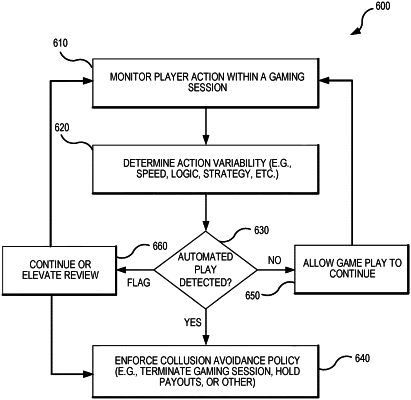| CPC G07F 17/3241 (2013.01) [G07F 17/32 (2013.01); G07F 17/3209 (2013.01); G07F 17/3211 (2013.01); G07F 17/3239 (2013.01); G07F 17/3246 (2013.01); G07F 17/3248 (2013.01); G07F 17/3255 (2013.01); G07F 17/3258 (2013.01); G07F 17/3272 (2013.01); G07F 17/3276 (2013.01); G07F 17/3279 (2013.01); G07F 17/3288 (2013.01); G07F 17/3293 (2013.01); G07F 17/3295 (2013.01); G07F 17/34 (2013.01)] | 20 Claims |

|
1. An electronic gaming system capable of implementing electronic countermeasures against collusion or cheating during an electronic game, the system comprising:
at least one processor;
at least one memory device operably coupled to the processor;
a communications interface operably coupled to the processor and to a host computer hosting the electronic game, and configured to establish communication via the Internet between the host computer system and a mobile player terminal operable by a player; and
an artificial intelligence (AI) system operably coupled to the processor via the communications interface,
wherein the AI system is configured to employ supervised or unsupervised learning algorithms directed to identification of abnormal behavior by the player, colluding players, or other types of cheating,
wherein the at least one processor is configured to:
determine a risk level for the player in the electronic game based on a reputational profile developed using background data about the player ingested via the communications interface from public or private data sources;
cause the host computer system to initiate an electronic gaming session for the electronic game on the mobile player terminal in response to a request by the player to play the electronic game, wherein to cause the host computer system to initiate the electronic gaming session, the at least one processor is further configured to cause action from the electronic gaming session being played by the player to be presented on a display device of the mobile player terminal;
receive, via the communications interface, signals encoding data representative of: a state of the electronic game being played by the player, and game play information representing player interactions in the electronic game by the player using the mobile player terminal, wherein an amount of the data representative of the state of the electronic game and the game play information captured increases with increasing risk level,
wherein the AI system is further configured to:
ingest, via the communications interface, at least the data representative of the state of the electronic game and the game play information;
evaluate the signals in real-time during play by the player in the electronic game and according to a collusion avoidance policy for the electronic game; and
determine that the player colluded or cheated during the electronic game based on the signals being evaluated,
and wherein the at least one processor is further configured to:
in response to it being determined by the AI system that the player colluded or cheated during the electronic game, cause an action to be implemented on the mobile player terminal to enforce the collusion avoidance policy, wherein to cause the action to be implemented on the mobile player terminal to enforce the collusion avoidance policy, the at least one processor is configured to cause payouts to be held subject to further review.
|